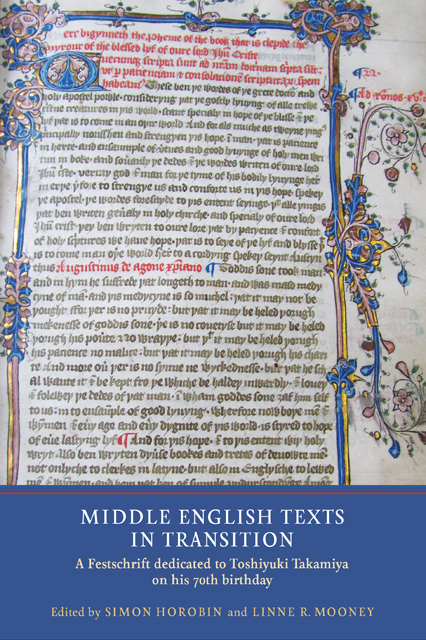 Middle English Texts in Transition
Middle English Texts in Transition Published online by Cambridge University Press: 11 March 2023
This paper, originally delivered at the Early Book Society conference in honour of Professor Toshiyuki Takamiya in York in 2011, arose out of the 2009 Oxford conference ‘After Arundel: Religious Writing in Fifteenth-Century England’. In preparing my own contribution, I spent some time looking at Arundel’s Constitutions in relation to the restrictions on the circulation of books and looking for evidence that these restrictions were enforced in the 120 years of their existence. There is ample evidence for their being enforced in relation to reading, and owning translations of, scripture, but very little evidence that they were enforced in terms of the actual approval, or licensing, of texts. It is the evidence for the licensing of books throughout the fifteenth and into the mid-sixteenth century which will be the focus of this essay.
The Context
The Constitutions of Thomas Arundel, Archbishop of Canterbury (1397, 1399–1414), were issued in the convocation of November 1407 and repeated in that of January 1409. They came to prominence more recently in 1995, when Nicholas Watson wrote his much discussed and disputed Speculum article on ‘Censorship and Cultural Change in Late-Medieval England’. The sixth and seventh constitutions relate specifically to books: the sixth deals with the textbooks used in the Universities and the seventh with translations of scripture. The sixth (‘Quia insuper nova via’) describes how universities must deal with books of Wycliffe or since Wycliffe – they are to be examined and passed to the stationers to copy, check for consistency, and sell or pass on, with a master copy in the University chest.
In this essay I deal with the seventh constitution, the only new addition to what Jeremy Catto has seen as no more than ‘republishing the prohibition of unlicensed preachers and the measures to control unorthodox opinion in Oxford which had been enacted in [the Blackfriars Council of] 1382’.
To save this book to your Kindle, first ensure [email protected] is added to your Approved Personal Document E-mail List under your Personal Document Settings on the Manage Your Content and Devices page of your Amazon account. Then enter the ‘name’ part of your Kindle email address below. Find out more about saving to your Kindle.
Note you can select to save to either the @free.kindle.com or @kindle.com variations. ‘@free.kindle.com’ emails are free but can only be saved to your device when it is connected to wi-fi. ‘@kindle.com’ emails can be delivered even when you are not connected to wi-fi, but note that service fees apply.
Find out more about the Kindle Personal Document Service.
To save content items to your account, please confirm that you agree to abide by our usage policies. If this is the first time you use this feature, you will be asked to authorise Cambridge Core to connect with your account. Find out more about saving content to Dropbox.
To save content items to your account, please confirm that you agree to abide by our usage policies. If this is the first time you use this feature, you will be asked to authorise Cambridge Core to connect with your account. Find out more about saving content to Google Drive.